#knight commander meredith
Text


Have you heard of the tragedy of the Champion of Kirkwall?
+ Bonus
The og post that made me go insane

#dragon age#dragon age 2#fanart#varric tethras#hawke#ive been slowly going insane thinking about how in da2 you lose no matter what you do or change#silver fox varric#femhawke#leandra amell#knight commander meredith#meredith stannard#first enchanter orsino
17K notes
·
View notes
Text

✦︎ Queen of Swords ✦︎
#dragon age#dragon age 2#meredith stannard#knight commander meredith#biowaregames#bioware fanart#fanart#digital art
2K notes
·
View notes
Text
REPOSTOBER, DAY 24: the deadly foes (2017)


Knight Commander Meredith and Marian Hawke, the champion of Kirkwall.
Fun story: I met my partner because of this Meredith sketch (and he also did Carver cosplay back in 2016).
388 notes
·
View notes
Text


✦ Knight-Commander Meredith Stannard
#dragon age#dragon age fanart#levikra draws stuff#digital art#dragon age 2#fanart#da2#meredith stannard#knight commander meredith#illustration#i am gay for her
3K notes
·
View notes
Photo

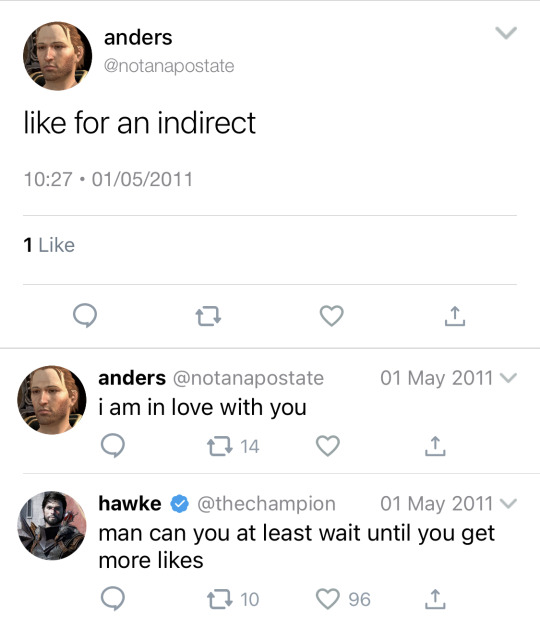



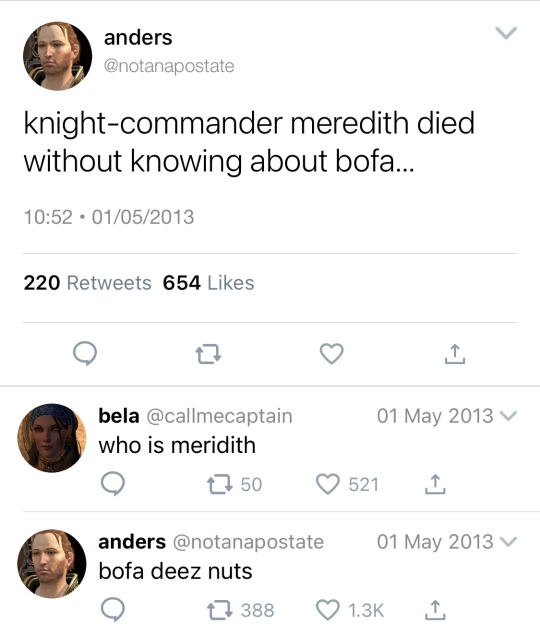

dragon age twitter au? dragon age twitter au. ANDERS EDITION
#dragon age#anders#meme#da2#dragon age twt#handers#sorta#hawke#fenris#merrill#isabela#meredith#knight commander meredith
1K notes
·
View notes
Text
hey uh. so Meredith and Orsino both had to like. take the ferry to the Gallows during the last straw to like. get in place before the real fighting started I guess. what. do you think that ride was like. did they take the same boat. did they take separate boats at the same time and just glare at each other on the way over. did they get to the docks and there was only one boat so they rock-paper-scissored over who got to go first
#like the scene starts in like lowtown or whatever and then they’re both like#‘we meet at the gallows to do battle’ and just leave#and I think they’re both there hh the time you get there#I’m#what kind of coordination dhsksjsh#dragon age#dragon age 2#knight commander meredith#Orsino#this has been a post
269 notes
·
View notes
Text

Had a hilarious mental image and felt inspired
#saw art of what i thought was meredith smoking weed#then saw it was a warhammer character lmao#dragon age 2#meredith stannard#knight commander meredith
226 notes
·
View notes
Text

" Let's have some Fun~!!"
🚨Poison and Hugo have entered the stage🚨
--
And so completes my Colour Wheel Challenge!! <8'D
I had a lot of fun with this, f'real~
and hope you enjoyed the progression as much as I did working on it!
--
Kofi | Patreon
#poison kiss#hugo andore#colour wheel meme#colour wheel challenge#fanart#street fighter#knight commander meredith#leonie pinelli#ryan goldsmith#golden ryan#wild tiger#kotetsu t. kaburagi#aoba seragaki#venom#spyro the dragon
77 notes
·
View notes
Text
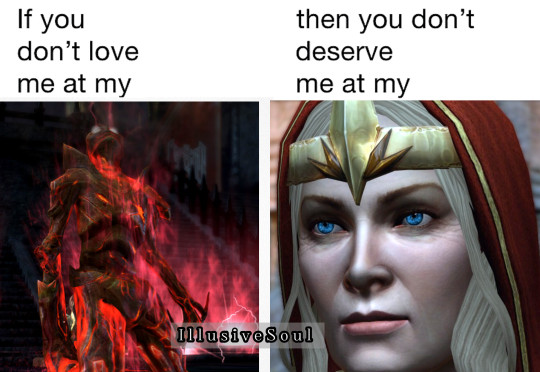
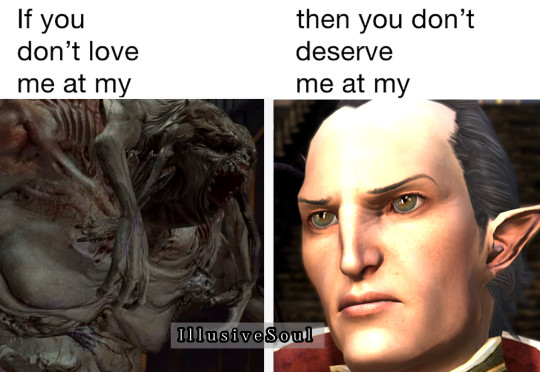
"He was a mage, she did red lyrium.
What more can I say?"
#dragon age#meredith stannard#first enchanter orsino#dragon age memes#illusivedits#illusivesouledits#knight commander meredith#orsino dragon age#dragon age meme#meredith dragon age#dragon age orsino#dragon age meredith#dragon age 2#red lyrium#da2#da:2#da: 2
86 notes
·
View notes
Text
Meredith's Mistakes: A Study in Power
The full-scale rebellion of mages across Thedas against the Circle system of the Andrastian Chantry officially begins in 9:40 Dragon, with the uprising at the White Spire and a vote by the College of Enchanters to separate from the Chantry. But the seeds of the rebellion are planted years earlier in Kirkwall, where the extreme Circle policies of Knight-Commander Meredith Stannard lead to the destruction of the city’s Chantry by apostate mage activist Anders.
Knight-Commander Meredith’s reign of terror over her Circle and over Kirkwall itself is abruptly ended during her battle with Hawke when the sword forged from a red lyrium idol found in the Deep Roads corrupts her totally, turning her to a frozen lyrium statue herself (though as we have more recently learned, it did not destroy her completely). This was catalyzed by the destruction of the Chantry, Meredith’s invocation of the Right of Annulment, and the mages’ subsequent resistance. But had all that not happened the way it did, I believe that an end to Meredith’s rule had already become inevitable. The Knight-Commander makes several grave mistakes in maintaining her power, some of which begin years before she acquires the idol, but are dramatically escalated by her exposure to red lyrium.
And it’s because of those mistakes that the mage rebellion truly has its roots in Kirkwall.
Circle Dispensation
Throughout the Dragon Age universe we meet mages like Wilhelm Sulzbacher, Ines Arancia, Severan, Vivienne, Finn, and Wynne: Circle mages given special dispensation to travel, work, and even live outside the Circle proper.
This privilege proves to be a highly effective tool of Circle control, and a critical part of the Chantry's strategy for keep mages contained.
Prior to the the destruction of the Kirkwall Chantry, it seems that this sort of thing is quite commonplace in most Circles. Not for most mages, of course. But for well-established Enchanters who have proven their magical competency, and most importantly their loyalty, certain privileges may be afforded. Thus, compliance is incentivized for any mages who might aspire to some limited but additional freedoms and are willing to toe the line to get them.
In most cases, these mages are still denied the rights of non-mages: to own property, to hold a title, to marry and raise a family. (Wilhelm is a notable exception to the latter, but this seems rare.) But a mage like Ines Arancia might be afforded the opportunity for field research and publication. A mage like Wynne or Finn might gain the prestige of traveling at the side of a hero. And a mage of ambition such as Severan, Wilhelm, or Vivienne might even attain the title of Court Enchanter, serving at the side of a King or an Empress (even if the title is in many cases purely ceremonial) and mingling with the court.
Here's a basic principle that is critical to understanding politics, real or fictional: most people are primarily concerned with the material wellbeing of themselves and their immediate loved ones. Many people will engage in various forms of activism in the hopes of improving conditions for themselves and others, but truly revolutionary activity is an extremely unappealing prospect for the average person most of the time. And it's not because they're callous or apathetic. It's because they have too much to lose. Revolution is bloody and horrific and sometimes necessary, but there are always heavy costs to be weighed against the potential (and by no means guaranteed) gains.
It is no accident that of the mages we meet and get to know personally, the ones with the most to say in support of the Circle are also the ones who have gained significant privileges within that system—and who therefore have the most to lose from an attempted rebellion which may not succeed. I have written before about the conversation between Wynne and the Warden in Awakening, in which Wynne expresses concerns about the College of Enchanters potentially voting to break away from the Circle. "The mages will never be free," she says. "The Chantry would never allow it. Our only hope for survival is to show them we can be trusted."
Notably, at this point in time, even Anders will agree that this is "madness" and "a recipe for disaster." Why would Anders, of all people, say this, given how adamant he is about his own freedom? Awakening Anders sums up what he wants out of life pretty well when he says, "All I want is a pretty girl, a decent meal, and the right to shoot lightning at fools." He's being glib here, of course, and there's probably a lot more going on under the surface (we're given to understand later that Anders has always had a lot of anger at the Circle), but I do think it's accurate to say that at the moment he's mainly concerned with maintaining his own freedom. And while he and Wynne have very different opinions of the Circle generally, I think Anders doesn't at this time relish the thought of a full-scale war, with Templars roaming the land hunting renegade mages. You can see how that might actually make it harder for him to fly under the radar as an apostate.
Nearly a decade later, Vivienne will express her own opinions on the mage rebellion that is already well underway, calling it "A failure of perspective that infected Circle leadership." Unlike Wynne, Vivienne's objections are less about the unstoppable power of the Chantry and more about the attitudes the general population holds toward magic. "Kirkwall gave the world a reason to remember its fear of magic," she says. "A mage killed hundreds with a snap of their fingers. …By voting when they did, my colleagues all but declared war upon the ordinary people of Thedas, a war in which we are outnumbered a hundred to one." Vivienne's argument (if you take it at face value) is that the rebellion was poorly timed and generally unwise. "By all means, protest abuses by templars," she says. "Just don't do it in a way that suggests mages support wholesale murder."
Notice that Wynne does not say that mages shouldn't be free but that they won't be free. She does not say that bowing to Chantry oversight is the right thing to do but that it is mages' only hope for survival. Vivienne's objection (as stated, anyway; Vivienne’s motives are complicated and another post for another day) is not that the vote for independence supported murder but that it appeared to support murder. In these conversations, the argument is never really that mage rebellion is immoral, but that it is unwise, impolitic, bad optics, bad public relations, not smart.
A point on which even Anders once agreed.
And why would a full-scale mage rebellion look like the best option to Wynne and to Vivienne—to mages who have spent years and decades working to gain the respect and trust required to be granted the maximum amount of lenience the Circle allows? Why would they throw away what they have gained for a war they don't believe they can win?
If enough mages believe that compliance is a more reliable strategy than resistance, you won’t get the critical mass for a rebellion.
But even Wynne fights back when the Right of Annulment is invoked upon her Circle.
One of the most foolish things a ruler can do in terms of maintaining their own power is to allow conditions to deteriorate to the point where their subjects feel they have little or nothing left to lose. And that's exactly what happens in Kirkwall.
This is Knight-Commander Meredith's first mistake: she fails to positively reinforce compliance.
We get the sense that the Gallows was always a strict Circle. There's talk of the Knight-Commander's severity when Hawke first arrives, long before Meredith gets her hands on red lyrium. The kind of special dispensation that Wynne and Finn enjoy from the Fereldan Circle is likely far less common here.
There is some evidence that such things occur under Meredith, even post-lyrium-sword, however rare it may have been. Notably, if Bethany Hawke goes to the Circle, she is given permission to go with Hawke to the Vimmark Mountains, and to Chateau Haine. In terms of game mechanics, this is obviously done so that the player can have a bit more time with their sibling as a companion, and for the Legacy DLC specifically, the Carta has actually been breaking into the Circle trying to capture Bethany, so it does make some sense that Meredith would want that dealt with, enough to let Bethany go with Hawke to deal with it.
But Chateau Haine is purely a pleasure trip, and Bethany is still allowed not only to leave the Gallows, but to travel outside Kirkwall with her sibling. It would be very easy for her to run away if she chose, and she would have a solid head start on the templars pursuing her. Bethany has demonstrated herself a loyal Circle mage at this point, with no intention of escaping, but I think that's not all that's going on here.
Let's talk about Emile de Launcet.
In Act III, Hawke is given the task—or has their arm twisted, depending on how you're playing—of tracking down three runaway mages. The first two, Huon and Evelina, are a blood mage and an abomination respectively and attack, leaving Hawke no choice but to kill them. The third, however, is a man named Emile de Launcet, who reveals that having been in the Circle since he was six years old, he simply wanted to live a little. He also reveals that he himself spread the rumor that he is a blood mage, hoping that it would make him seem "dangerous" and therefore more attractive to women.
It's easy to write off Emile as simply a fool, but I think there's more going on here.
How does a man who has spent almost his entire life in the Gallows, who is well-acquainted with the Knight-Commander's policies, think that telling people he's a blood mage is a good idea? In Act III? By this point in the game, it is well known that Meredith is accusing anyone who sneezes of being a maleficar; most of the Circle mages live in terror of just such an accusation. What in the Maker's name could possibly make this man believe that labeling himself a blood mage wouldn't get him killed, or made Tranquil, never mind caught?
Unless Emile de Launcet, the son of rich Orlesian expats (the Comte and Comtess Guillaume and Dulci de Launcet) has always received more leniency in the Circle than the average mage.
Bethany Hawke, daughter of Lady Leandra Amell who has come home to reclaim her family estate, sister of the Champion who saved Kirkwall from Qunari invasion, seems to quickly decide that life in the Circle isn't so bad. Undoubtedly, a large amount of Bethany's relief is she doesn't have to hide anymore and be constantly protected by everyone around her, and she appreciates the opportunity to be around other mages. But she also says in party banter that "The idea of the Circle is much more terrifying than the reality of it." She frustrates Anders with her acceptance of her new life, and judging by Ella's words, Bethany seems to encourage the apprentices she mentors to accept theirs as well.
Bethany and Emile's experiences with the Circle do not fully reflect what we know of the Gallows, and I think that's because they're both from noble families. This is important for other reasons too, and we'll come back to it.
But for now, what's worth noting is that the only examples we have of Meredith's leniency are for political expediency and accidents of birth rather than actively rewarding compliance.
I think it’s safe to say that even before things escalate to all mages confined to their quarters, not a lot of mages in the Kirkwall Circle are going out on leave for botanical studies. But as her paranoia deepens due to her exposure to red lyrium, as she begins to see blood magic and demons around every corner and in every person, Meredith stops rewarding compliance at all. There are no “good mages” and “bad mages”; there are only mages, not a one of whom can be trusted. Fewer and fewer privileges are afford to any mages in the Gallows, until eventually it is clear that all mages will be punished simply for being mages. There is no incentive for "good" behavior.
That's how you brew a rebellion, kids!
And when she invokes the Right of Annulment, not one of those mages has anything left to lose.
I am far from the first person to point out that Anders spends his first seven years in Kirkwall attempting to change things for the mages by relatively nonviolent means. He wins massive goodwill from Kirkwall’s lower classes with his medical clinic in Darktown. He appeals to the upper classes the only way he can reach them, through his impassioned writings on mage freedom. (And the upper class is a critical piece of the puzzle here, but we’ll come back to that.) He works with an organized Mage Underground to rescue as many individual mages from the Circle as possible.
But by Act III, the Mage Underground has been completely dismantled, and ambient dialogue in the Gallows tells us that Meredith has confined all mages to their quarters and has already sent for the Right of Annulment, well before Anders takes his final action. She has yet to actually receive permission, and we cannot know whether she actually would have, but given that Divine Justinia has already threatened an Exalted March on Kirkwall through her Left Hand, it doesn't seem out of the question that Meredith's request would be granted so long as she provided the Divine with a plausible excuse. It is also very possible that in the absence of a reply, Meredith simply would have invented an excuse to invoke the Right without waiting for permission (given that she does exactly that after the Chantry explosion), and it's likely that is exactly what Anders—and every mage in the Circle—fears will happen.
And had that happened, every mage in the Gallows would have been locked in their quarters, alone, when templars came to their door to kill them.
By destroying the Chantry when he does, Anders provokes Meredith to invoke the Right of Annulment without waiting for Chantry permission, but critically he also does so in such a way that the mages have advance warning of their sentence. They have time to gather and organize, to fight back, to allow at least some of them to survive. Anders has broader goals for a mage rebellion, absolutely—goals which may or may not be met. But his immediate goal is to give the mages in the Gallows a chance to survive. And he does succeed in giving them that chance, regardless of what happens after. He also kills hundreds of people, many of them not templars or clerics but simply citizens of Kirkwall caught in the fallout—many of them undoubtedly lower-class citizens of Lowtown, including elves in the alienage. (The collateral damage is canon, and not just per dialogue in Inquisition; you can see flaming debris raining down over the place where Hawke is standing in Lowtown after Anders sets off the explosion, and Lowtown is on fire as you make your way to the docks, so this really isn't a point I'm interested in arguing.)
Whether Anders’ actions are morally justified, what kind of collateral damage is justifiable in the process of liberating an oppressed people, ultimately comes down to a trolley problem; I’m not going to get into that here and I’d appreciate it if people would refrain from having that argument on this post. What I do hope to demonstrate here is that something like what Anders does is the predictable and inevitable outcome of conditions deteriorating and abuses escalating for a subjugated people until there is quite literally nothing left for them to lose.
That is, in my opinion, Meredith's biggest and most obvious mistake. But there are two other failures that contribute to her downfall, and which I believe would eventually have led to her being removed from power.
The Absent Puppet
Following the failed Qunari invasion, Meredith increasingly alienates the nobility of Kirkwall.
There is an excellent post by @mllemaenad analyzing Elthina’s strategy for “mediating” the mage-templar crisis in Kirkwall and maintaining her own power. This post touches on Meredith’s second and third mistakes in several facets and it's also a fantastic analysis of Elthina's character that really helped me to understand her; I'd highly recommend reading it.
I have on occasion sees the nobles' opposition to Meredith read as support for mage freedom. I strongly disagree; that is not what’s going on here. This is apparent if you’ve played both the templar and the mage endings of DA2 and paid attention to the epilogue slides. Hawke can actually become the next viscount of Kirkwall—but only if Hawke sides with the templars.
The nobility on the whole do not want the Circle abolished. They are not interested in opposing the Chantry outright; when Elthina "gently" sends them home after Orsino's speech, they all comply. They were even willing to tolerate blatant Chantry puppet Marlowe Dumar as Viscount. Let's be clear here, the Chantry has ruled Kirkwall in all but name since the deposition of Perrin Threnhold. The nobles know this. (Even the random nobody city guard Hawke speaks to at the beginning of the game knows this; it's the worst-kept secret in Kirkwall.) So long as there is a noble ass on the throne, the Chantry maintains at least the appearance of a "proper" social order, and the nobles are willing to live with that because it does not overly inconvenience their lives, and as established previously, their own mage children will receive some leniency in the otherwise strict Circle.
Meredith openly seizing control of the city is a bridge too far. The Knight-Commander cannot rule the city outright; this is not how things are done. The nobles want to unseat Meredith, but they do not want a rearranging of the social order as they know it. That means a functioning Circle of Magi that keeps the mages contained over there, where they don't have to think about them, and a proper noble ruling the city at least in name. They do not want a coup by an anti-Circle radical. If Hawke fights with the mages, the nobles will not support Hawke as Viscount. But a pro-templar Hawke by the end of the game has accomplished what the nobles want. They have removed Meredith from power, while demonstrating to a city that still fears magic that they will continue to keep mages subjugated.
The Chantry and the nobility are always deeply intertwined, but the Chantry in Kirkwall has a particular stranglehold on the city’s civil government, more so than in other nations. That the nobility have been pushed to the point of opposing Meredith at all speaks to how gravely she has fucked up.
Chantry Authority
And finally, as MlleMaenad aptly explains in the post linked above, Meredith has alienated her superior in the Chantry, Grand Cleric Elthina—in part because she has stopped playing the game they both once implicitly agreed to. Her abuses of power have become too public. She has agitated the mages to the point that her First Enchanter is out protesting in the streets. In Hightown. She has alienated the nobility and turned public opinion against her. And that makes the Chantry look bad in turn. It makes Elthina look bad. If nothing else, it makes Elthina look like she (and by extension the Chantry) no longer has control over the Circle, and that’s a big problem. Elthina deftly distracts everyone from this problem by pretending to be a third-party mediator between the mages and templars instead of the person holding jurisdiction over all of them. But the conflict spilling into the streets of Hightown is a big problem for her.
As detailed by MlleMaenad, Elthina has no problem with what Meredith has been doing to the mages. She does have a problem with Meredith ranting and raving about how mages should be made an example in public, in front of the nobility—some of whom have family members in the Circle. (Again, this is why Hawke meeting Emile de Launcet is so important. This is why you have to talk to his parents, so that there can be no mistake about who he is.)
My one quibble with the excellent post linked above (and it’s largely a semantic quibble and not a practical one) is the statement that Elthina has no morals. I would argue that from Elthina’s perspective she has a very strong moral code—one that demands she defend the authority of the Chantry against all threats and at any cost, including the cost of her own life. Which is exactly what she does.
Multiple times, Elthina can be warned of the danger to her life if she stays in Kirkwall (once in Sebastian’s DLC sidequest “Faith,” and once if Hawke chooses to warn her about whatever Anders is planning). In both cases, she refuses to leave. “I am Grand Cleric,” she says. “Who would dare attack me?”
It’s easy to look at Elthina as simply overconfident, and I certainly agree that there’s an arrogance to her personality and the way she handles things in Kirkwall. But I’m not actually sure that her death is a political failure. I don’t mean that she wants to die, or that somehow she plans to. But to leave Kirkwall to protect herself would show weakness—not only in herself as an individual, but in the institution she represents. In refusing to flee from danger, and in dying for that decision, Elthina makes herself a martyr for the faithful. And in doing so, she probably sways a few people who might have at least sympathized with the mages to oppose the rebellion more harshly than they might otherwise have done.
That death, that martyrdom, serves as a pretty effective distraction from the fact that Meredith, whose actions made something like Anders’ actions inevitable, is Elthina’s problem to begin with. Indirectly, Meredith has become a threat to the Chantry’s power over Kirkwall, and she cannot be easily replaced without a tacit admission that Elthina has already failed to maintain control of her own Knight-Commander. If Elthina’s end goal is to maintain the power of the Chantry over Kirkwall at any cost, standing her ground to the point of martyrdom isn’t a bad gambit. It’s bad for Elthina herself, of course, but for the Chantry? Grief over her loss brings sympathy for her side and aid from Starkhaven by Sebastian’s hand, thus maintaining a Chantry presence in Kirkwall after the disaster and reinforcing the very useful image of the Chantry as a charitable organization, cruelly destroyed by a madman.
That’s a powerful narrative, and Elthina’s choices help create it.
But it only becomes necessary in the first place because Meredith, after years of success, is failing to maintain her power—in part, thanks to the arrival of an outside variable that no one could have foreseen, the red lyrium that pushed her existing paranoia to the breaking point.
Had Anders not destroyed the Chantry, the Meredith Problem would only have continued to escalate. At some point Elthina would have had no choice but to remove her from power, because the damage to Chantry authority of allowing her to continue would outweigh the damage of removing her. There are conceivably ways Elthina could go about this indirectly, giving the appearance that the Knight-Commander had been killed by a rebellious noble or even a blood mage, thereby avoiding any official admission of failure by the Chantry. Her priority would not be to replace Meredith with someone more lenient, but rather with someone able and willing to play the game, the same one she and Meredith played so well together before Meredith went off the rails. Keep the nobility complacent and the underclasses powerless. Maintain the balance. Protect the Chantry’s authority at all costs.
It would likely be quite troublesome to arrange, and Elthina thus far has been loathe to do it, but I don’t doubt that she would do it if she had no choice. And given what we have seen of Divine Justina and how she operates (see also: @v-arbellanaris’s excellent meta series on Justinia and particularly part 3) I feel confident saying that Justinia’s message to Elthina in “Faith” is both a warning and a threat: Get your city and your Circle under control or I will do it for you.
I also think that Sebastian, whose entire character exists at the intersection of Chantry and noble politics, realizes this, hence his urging Hawke to downplay the situation in Kirkwall to convince the Divine that her intervention is not necessary. For all Sebastian’s faults, at this point in his arc he really is concerned with preventing needless bloodshed, but he also cares very much about Elthina, whom he sees as kind of a mother figure. Sebastian is no fool; he can read between the lines and understand that if Justinia feels compelled to intervene against Elthina’s wishes, there will be no protection for Elthina.
Justinia’s suggestion that Elthina leave Kirkwall isn’t simply concern for her life should open war break out in the city; it’s also giving her a kind of third option, an "out”: if Elthina leaves Kirkwall of her own free will, she is signaling to the Divine that she does not have things under control and is willingly accepting Justinia’s intervention. This will irreparably damage Elthina’s reputation politically but it might save her life. In refusing to leave, Elthina is also declaring to her superior, “Your intervention is not necessary. I have this under control.”
She does not have it under control, and at some point she’s going to have to deal with that. As she answers to the Divine, Meredith answers to her. Elthina will not maintain her own power if she cannot maintain control of those under her and keep the support of those above her. Meredith is in the same position, just one step down. Neither of them are actually succeeding. This wing of the house of cards is set to collapse, one way or another. (And it’s arguable that Justinia isn’t actually succeeding either, but that is, again, another post.) All that remains to be seen is who will survive the collapse.
Conclusions
This is why Knight-Commander Meredith's actions lead to Kirkwall being the first Circle to fall. She fails to reward compliance and allows conditions to deteriorate too far; she oversteps her bounds and alienates the nobility; and she is even beginning to run afoul of Chantry authority itself. By Act III, Meredith’s regime is doomed.
Which is not to say that I think a mage rebellion actually getting off the ground is inevitable. On the contrary—even given Meredith’s downfall, things could have gone very differently had certain characters acted differently at various points. Had Elthina actually chosen to leave Kirkwall, tacitly inviting an Exalted March on the city, I think things would have gone very differently. Had the conspiring nobles managed to remove Meredith from power before things came to head as they did, things might have gone very differently. And had Anders not chosen that desperate yet still strategic moment to attack the Chantry, thus setting off not only the Kirkwall annulment and rebellion, and subsequently the locking down of Circles all over Thedas, thus pushing more and more mages toward open defiance, things might have gone very differently. Had Justinia herself taken different actions, not taken others, responded differently to the escalating tensions, things might have gone very differently.
Meredith’s actions, however, make some kind of dramatic shake-up of Chantry power inevitable. I think it’s even possible to see this collapse as the long-term result of previous Divine Beatrix III overstepping her bounds, upsetting the careful political balance between Chantry and nobility when she effectively engineered a Chantry takeover of a major city-state; that situation was likely unsustainable in the long term, and we are now seeing the fallout of it. What form this inevitable shake-up takes, and its ultimate outcome, depends on the actions of many other characters.
So why write all of this? Because I think Meredith’s rule and her downfall is a fascinating study in power. Beneath the fantasy elements, there’s an understanding in her narrative of how tyrants and autocrats rule, how they maintain power and also how they lose it. And these stories about power and power dynamics are some of my favorite elements of the Dragon Age series.
The same principles also apply to various other rulers in Dragon Age… but that’s another post for another day.
#meredith stannard#elthina#dragon age meta#dragon age 2#justinia v#dorothea#dragon age#blunders of thedas#knight commander meredith#grand cleric elthina#divine justinia#chantry explosion#chantry politics#thedas politics
367 notes
·
View notes
Text

too many thoughts. not really all good.
#dragon age#dragon age absolution#hawke#knight commander meredith#corypheus#dragon age absolution spoilers#da absolution#miriam#dragon age 2#da2#dai#dragon age inquisition
272 notes
·
View notes
Text

Confession: The thought of Knight Commander Meredith pussy has me behaving unwisely
#knight commander meredith#meredith stannard#dragon age#dragon age 2#bioware#dirty confessions#dirty confession
24 notes
·
View notes
Text
listen, listen
I know this is gonna be a controversial take, but the more I think about it, the more obsessed I am with the idea of Varric voluntarily helping The Crimson Knight (especially in a worldstate where Hawke was left in the Fade).
I’ve talked before about how I view Meredith as the type of person who is motivated by her desire to protect her own at all costs, and how this leads her down the path of Well-Intentioned Extremism, and culminating in becoming the embodiment of the uh, Knight Templar trope.
And Varric is obviously motivated by his motivation to protect Hawke: he shielded them from the Inquisition, and when push came to shove and he was forced to expose Hawke to the Inquisition anyway, it can result in Hawke’s death. The Inquisition fails Hawke, who is basically Varric’s moral compass — without Hawke’s influence, he defaults to siding with the templars at the end of DA2.
Most of the Inquisitor’s inner circle scatters over Thedas and Varric returns to Kirkwall. Varric loves Kirkwall; he’s a Kirkwaller through and through: even though he’s never envisioned nor wanted a life of politics, he becomes the fucking viscount, because there’s nobody else left who wants one drop of the poisoned chalice of that role.
And Kirkwall is a city that has always been dependent on its templars for protection. They are the city’s military force, and the city is noticeably weaker once the templars abandon it — depending on world state, it can lose a significant portion of its territory to one of Varric’s former companions. If someone he knew and trusted can do that to Kirkwall, who else might take advantage of Kirkwall in its weakened state?
Varric is isolated and alone, away from anyone who might be able to help him see the situation in a different light: his main support network is Aveline and Seneschal Bran, neither of whom are known for their ardent support of mage rights. They’re doing their best to clear Kirkwall of the impacts of the war, of the red lyrium, and even though they’re doing their best to avoid exposure, being around that much red lyrium cannot be healthy. Slowly, the paranoia and increased penchant for violence settle in. It becomes impossible to resist spending more time around the substance — and sometimes, it talks! And it sounds like Meredith Stannard.
Varric is desperate and scared and has lost everyone he has ever loved. The Inquisition has been downsized or disbanded, and his only purpose is to serve his city: the same intention with which Meredith started, the same intention and fears that the red lyrium feeds upon in them both.
Varric fears becoming his parents: people who failed to protect him because they were too caught up in their past mistakes.
But sometimes, as people, in our attempts to avoid our fears, we end up barreling into them headfirst instead.
#do i actually think bioware is gonna give us a varric tethras corruption arc? no#but the narrative parallels are there and i just think they’re neat!#and like i never expected in my wildest dreams that meredith stannard would have actual plot relevance in 2022 so!!#and back when dragon age exodus the da2 expansion was still being considered#varric was meant to die at the end 🤔🤔🤔#tbh i don’t expect this to crop up in da:d bc there is SO much to cover and doing the writing for a world state with alive pro-mage hawke#would be tricky#but that’s why we have fanfiction#bless transformative fiction for letting us explore endless possibilities outside of the limitations of commercial interests!!#also emo about how both varric and meredith carry so much GRIEF about their families#and grief can cause people to do dangerous things#and when that’s coupled with positions of power …!#this is also tangentially a meta about the intersection of trauma and how power corrupts#thedas is not an environment conducive to healing lol#anyway i will continue to spin these thoughts around like a plate in a microwave#da absolution spoilers#dragon age#meredith stannard#knight commander meredith#varric tethras#dragon age meta#asha meta#asha’s villain manifesto#also warning that the trope links lead to tv tropes lol#bc I’m tired of people acting like fictional characters (vehicles for a narrative) are real people (capable of causing real world harm)
170 notes
·
View notes
Text
Varric shutting down the Gallows with the Meredith statue still in the courtyard: Nothing bad could come of this
Meredith: Bitch, you thought.
#dragon age absolution#absolution spoilers#absolution#dragon age#varric tethras#knight commander meredith
143 notes
·
View notes
Text
Thinking more about the Meredith Inquisition Antagonist AU and how it would've affected the world and story of Inquisition.
Because of instead of a Tevinter Magister, you've got the Knight-Commander of the Templar Order. Not a mage a Templar. One of the Chantry's own.
Like. Imagine how this would affect the Chantry and the Templars, when the world finds out that not only had a Templar blown up the Temple of Sacred Ashes—a holy site for those of the Andraste faith—but also killed Divine Justine V and many others, and is now one of the biggest threats since the Archdemon and the Darkspawn of the Fifth Blight.
Imagine the Inquisition's new mission is now not only to defeat Meredith and close the breech, but to also investigate the Chantry and the Templars for answers on how Meredith came back and if they had anything to do with it—and it's given to you by both Orlais and Ferelden.
And in the end, after the defeat of Meredith, you can pass one more judgement to Orlais and Ferelden before the game ends:
The fate of the Chantry.
You decide whether to let it remain as is, serverly limit their power to the point they are no longer the religious powerhouse they are, or completely get rid of it and rebuild from scratch.
The pros and cons are yours to weigh and the outcome is yours to decide. So what will you choose, Inquisitor?
#dragon age#dragon age inquisition#Meredith Stannard#inquisitor#the inquisitor#the chantry#anti-chantry#Ferelden#Orlais#templar order#knight commander Meredith
17 notes
·
View notes
Text
So like how did she come back?? Did she literally walk out of the black emporium all crusty or??

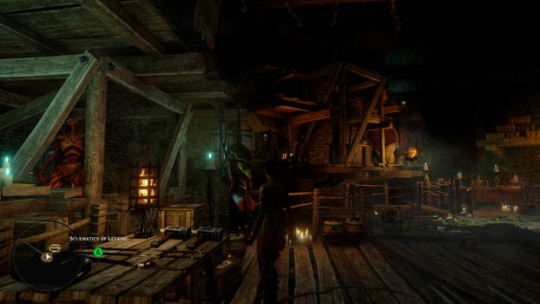

#da absolution#DAA#dragon age#dragon age 2#da2#dragon age absolution#knight commander meredith#Meredith#black emporium#hawke#DA
120 notes
·
View notes